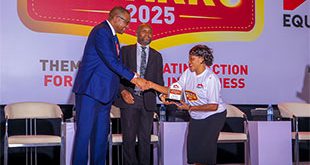
Kampala, Uganda | Patricia Akankwatsa | A forum of environmental activists in East and Central Africa is seeking to restore 100 million hectares of degraded land by the year 2030.
The project spearheaded by Global Ever-greening Alliance, Climate Asset management and the African Forest Landscape Restoration Initiative is expected to pave way for a greener Africa to mitigate the impact of climate change in Africa.
While speaking at a press briefing held on June 22nd at Speke Resort Munyonyo, Nigel Topping, the United Kingdom’s High-Level Climate Change Champion said that the real dynamism is the collaboration between nation-states and other non-state actors.
The African Land Restoration Forum will facilitate the creation of an action plan for collaboration to address the barriers we face and the challenges posed by climate change.
The stakeholders taking part in this landmark collaborative effort will contribute to the conversion of AFR100 pledges into tangible results.
Chris Armitage, the CEO, of Global EverGreening Alliance, said that project is particularly looking at areas that are vulnerable to climate change and provide an opportunity to generate carbon credits which can provide a return to investors that fund the project as well as additional revenue that flows back to communities.
“We are hoping to build on that model working with 15 countries across the region.”
In attendance will be 15 African governments, global and local NGOs, corporate investors and donors.
The Forum will build the capacity of all key stakeholders to make appropriately informed decisions about private sector investment in voluntary carbon projects and the handling of Article 6 of the Paris Agreement.
It will also create a dialogue where governments can actively work towards creating enabling environments for the scaling of restoration efforts.
Jonathan Muriuki, Interim Restore Africa Manager said that there is a lot of innovation done by various organisations but they don’t get the opportunity to synergize between one organisation and another.
“We are bringing countries together in terms of consortium with the hope that in the next five years we to have improved the livelihoods of 250,000 households,” he said.
“So, if you go by an average of 6 people per household that’s going to be about 1.5 million people that will be impacted (in Kenya)”, he added.
The African Land Restoration Forum follows the launch of Restore Africa, one of the largest farmer-led nature-based carbon programmes in the world, directly improving the lives of over 9 million people.
The Global EverGreening Alliance’s Restore Africa Programme (funded by Climate Asset Management and directly supporting the aspirations of AFR100) will accelerate and massively scale up the adoption of contextually appropriate agroforestry practices, whilst drawing down and storing carbon in the landscape across the East and Southern African Region.
Restore Africa will restore 1.9 million hectares of land and directly support the livelihoods of 1.5 million small-holder farming families.
The project will significantly contribute to the AFR100, which aims to bring at least a 100million hectares of degraded land under restoration by 2030.
“The scale of this one is very unique. It is the largest community-led land restoration programme in the world,” said Christof Kutscher, CEO, Climate Asset Management.
 The Independent Uganda: You get the Truth we Pay the Price
The Independent Uganda: You get the Truth we Pay the Price



There is need to plant fast growing trees. That is to say planting trees that will grow in a short period of time.
what are the roles of civil society organizations in this project